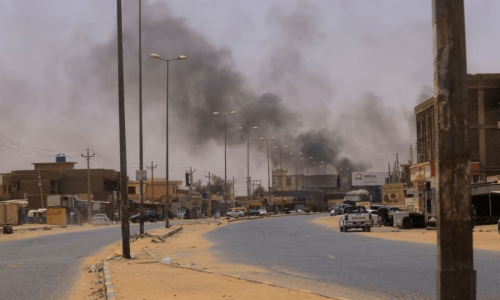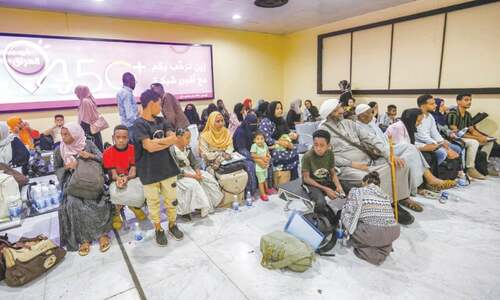WAD MADANI: Explosions again rocked Sudan’s capital Khartoum on Monday as the army rallied civilians to take up arms against a renewed onslaught by its paramilitary foes.
The sound of artillery fire shook the dawn in northwest Khartoum and progressed towards the centre and east of the city, witnesses said.
The fighting “began at 4:00am (0200 GMT) and is still going,” one resident said.
The war-torn capital barely saw a few hours of respite after heavy clashes on Sunday between troops loyal to army chief Abdel Fattah al-Burhan and those of the paramilitary Rapid Support Forces (RSF).
The army announced Monday it was ready to “receive and prepare” volunteer fighters, after Burhan last week urged Sudanese “youth and all those able to defend” to join the military.
War-weary civilians have largely rejected the call, pleading for an end to the relentless war between Burhan and his former deputy, RSF commander Mohamed Hamdan Daglo.
Later on Monday, witnesses reported the air force targeted an armoured RSF convoy as it wound its way from the country’s south towards Khartoum.
Outside the capital, some of the worst fighting has been in the vast western region of Darfur, where late on Sunday RSF forces “attacked the military base” in Nyala, the capital of South Darfur state.
Since April 15, nearly 3,000 people have been killed in the violence, according to the Armed Conflict Location and Event Data Project.
But medics warn the death toll is likely to be much higher, with about two-thirds of health facilities in combat areas still “out of service”.
A further 2.2 million people have been displaced within the country, with another 645,000 fleeing across borders, according to the International Organisation for Migration.
Darfur violence
Darfur is home to a quarter of Sudan’s population and is still scarred by a two-decade war.
Residents there, as well as the United Nations, United States and others, say civilians have been targeted and killed for their ethnicity by the RSF and allied Arab militias.
The RSF has been accused of intentionally targeting civilians in Darfur, including by shooting people fleeing towards the Chadian border.
The paramilitaries have also been identified as the main perpetrators of conflict-related sexual assault by survivors in both Darfur and Khartoum, according to the governmental Combating Violence Against Women and Children Unit.
Since the conflict began, RSF fighters — highly mobile and embedded in densely populated neighbourhoods — have been accused of widespread break-ins and looting.
Late on Sunday, the RSF announced it was cracking down on “looting and vandalism, particularly the theft of civilian cars”.
The force, which traces its origins to the notorious Janjaweed militia recruited in the early 2000s to crush a rebellion by ethnic minority groups in Darfur, announced last week it had begun to try some of its “undisciplined” members.
On Monday a coalition of Arab tribes from South Darfur announced in an online video its allegiance to the RSF, urging community members in the armed forces to desert and join ranks with the paramilitaries.
Children fleeing
More than half of Sudan’s population is now in need of aid, according to UN figures.
In addition to food and water, people are “also in need of protection”, the UN’s deputy special representative for Sudan, Clementine Nkweta-Salami, told Saudi-owned Al Arabiya television on Sunday.
She reiterated appeals “to both parties” to allow for supplies and personnel to enter the country and “move freely”.
Relief deliveries have been repeatedly looted and humanitarian workers attacked.
The situation has been especially horrific in Darfur, where entire neighbourhoods have been razed to the ground, cities besieged and bodies left to rot on the streets.
Barely any humanitarian assistance has reached desperate civilians, as aid groups report their teams standing by in neighbouring Chad, waiting for humanitarian corridors to open.
Since April, more than 170,000 people have fled Darfur across the Chadian border, according to the UN refugee agency.
“Thousands of families with children are fleeing the violence in West Darfur,” according to Mandeep O’Brien, country representative for Unicef which has reported hundreds of children killed in the fighting.
The UN agency estimates that more than 13 million children are in “dire need” of humanitarian assistance.
Published in Dawn, July 4th, 2023
















































Dear visitor, the comments section is undergoing an overhaul and will return soon.